
On May 23, 1783, Elizabeth Derby married Nathaniel West. As noted in last week’s blog, Betsey, as she was known, was the eldest daughter of the richest man in Salem, Massachusetts. Betsey was 21 years old, free to marry the man of her choice.
Nathaniel West, five years older than his bride, had been sailing ships for Elias Hasket Derby since 1777 and accumulated sufficient funds to support a family.
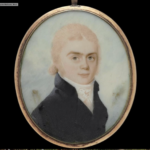
In 1785 Betsey gave birth to her first child, a son named Henry. Sources say this child spent his entire life in custodial care, though no direct reason is given.
Coincidentally, sources indicate that in 1785 Nathaniel West was in business as Nathaniel West & Company on the Boston Long Wharf. West continued to invest in voyages but no longer went to sea.
While the family was in Boston, two children, Martha (born 1787) and Nathaniel, Jr. (born 1788) joined the household. In 1791, the West family moved back to Salem. Three more children joined the family: Elizabeth (born 1790), Edward (1794), and Sarah (born 1797).
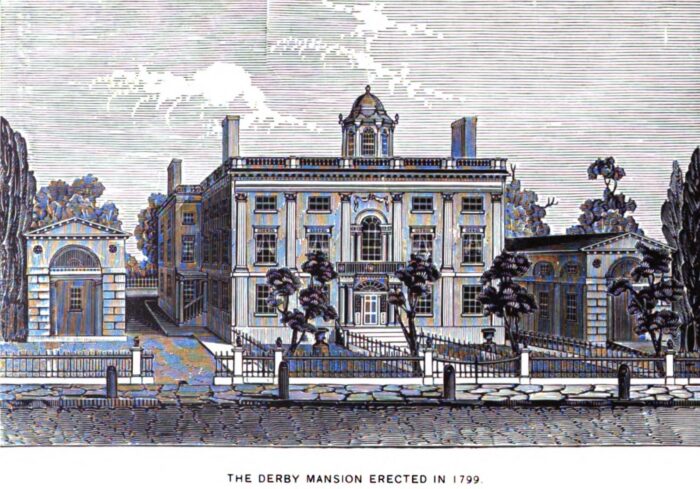
Last week, we noted that when Betsey’s father Elias Hasket Derby died in 1799, he didn’t bequeath her the recently completed family mansion. Instead, a disappointed Betsey received a very nice property called Oak Hill which she renovated from top to bottom, making it a showplace.
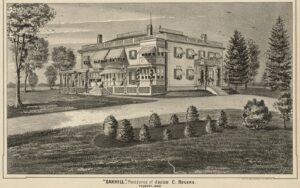
In 1803, four years after her father’s death, Elizabeth Derby West left her husband. Though initially she took up lodgings in town, perhaps for dramatic effect, Betsey must have returned to Oak Hill. In January 1805, diarist William Bentley noted “the bitter quarrel between the eldest daughter of the late E. H. Derby and her husband has been the subject of serious thought. It is now extending itself in consequence of some impudent resentments the husband has shown to visits paid his wife, while living at the farm separated from him.”
Divorce Law
Divorce law in Massachusetts was fairly straightforward. At the time of marriage, a wife’s property became her husband’s, and he was responsible for maintaining his wife. Divorce on grounds of adultery wasn’t unknown, but seldom occurred. After a divorce, any property once owned by the wife remained with her husband, who was only obligated to provide his wife with a “widow’s third,” or one-third of his estate.
Mr. and Mrs. West were among the wealthiest couples in Salem, more so as a result of their inheritance from Elias Hasket Derby. And Elizabeth Derby West had no intention of losing any of her inheritance. The situation changed in March 1806 when the Massachusetts Legislature approved a change in divorce law. In addition to her widow’s share, a divorced wife was entitled to any land her husband held in his wife’s name, and much of her own inheritance, IF she could prove her husband committed adultery. Here was an exit strategy Elizabeth West could use.
Elizabeth West Goes to Court
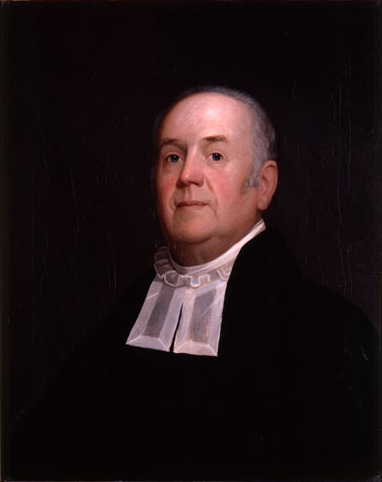
In May 1806, Bentley recorded that “in conversation with Mr. Martin I learnt the desperate attempts to ruin the reputation of Mr. West in order to procure a divorce.”
The hearing before the Supreme Judicial Court in Salem began on November 11, 1806. In court documents, Elizabeth charged “the said Nathaniel her said husband regardless of his duty and marriage vows, on divers days and times since their intermarriage as aforesaid has committed the crime of adultery with one Mary Taylor Sukey Appleton…Fanny Garrison and divers other lewd women whose names are at present to your libellant unknown, but which she trusts she shall prove to the court.”
West v. West generated a great deal of interest, both due to the parties involved, and also because it was the first divorce case since the new law came into effect. The decision would set a precedent by defining if the law applied only to adultery taking place after March 1806, or if it applied to the life of the marriage.
In court, Elizabeth produced a statement by a woman who claimed Nathaniel had fathered her two children, and a letter in which Nathaniel made financial arrangements for a child, though it wouldn’t carry “West” for a surname. Elizabeth also recruited, according to Bentley, “all the sweepings of the brothels in Boston, and all the wretches of Salem, Marblehead, Cape Ann” to testify against her husband.
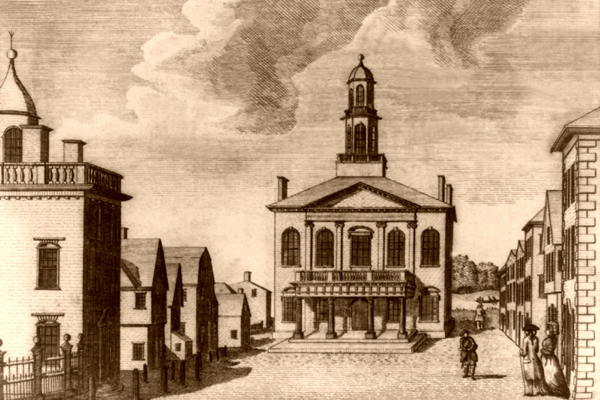
Nathaniel produced evidence that Elizabeth offered local women money, if they would claim he fathered their children. On November 13th, in his closing statement, Nathaniel’s attorney contrasted Nathaniel’s former position as a respected merchant with his present situation, the base character of the witnesses testifying against him, and the “shameful pains with which Mrs. West had waded in every filth and the virulence of the whole persecution.”
That evening, Elizabeth’s brother Elias Hasket Derby, Jr., invited Judges Sedgewick, Sewall, and Parker to dine with him. Bentley noted that under the circumstances, there was “no doubt that they had formed a judgment at the expense of Capt. West. The public indignation was aroused, but the judges are the jury.” The next day, “the judges pretend not to put any value upon the rogues employed. They say nothing of the suborned witnesses, of the infamous wretches that have been displayed before them.”
The Verdict
On November 15th, Bentley notes that in the court of public opinion, “it is indeed the same among all the citizens. That the court laid too much stress upon an affair upon which the father laid none, & which the wife did not resent for 20 years. That the wife has proved herself capable of the utmost malignity, that Gen. Derby has contrived a law & aided a malicious prosecution to gratify his enmity to West, and to possess & injure his property, & that although West is blameworthy, his behavior has been so much more honorable than of his opposers that he finds new testimonies of public favor.”
The divorce became official on November 19, 1806 with these notes in the official record: “the court are of the opinion that the material facts alleged in the libel aforesaid to sustain the charge of adultery are satisfactorily proved. It is therefore considered and decreed by the court here that the Bonds of Matrimony heretofore entered into between the said Elizabeth West and Nathaniel West for the adultery of the said Nathaniel be and hereby are dissolved.“
Dissolved, but not complete. What was Betsey’s Settlement? Did she seek further retribution? Did Nathaniel recover his reputation? Answers next week.
🏛🏛🏛
Illustrations
Elizabeth Derby West
Nathaniel West
Derby Mansion 1799
Oak Hill
William Bentley 1759-1819
Salem Court House
West v. West. Superior Judicial Court of Massachusetts. EWS.SJC.1806. West
William Bentley. Diary of William Bentley.
Harry Irwin West. Descendants of Henry West.

Sandra Wagner-Wright holds the doctoral degree in history and taught women’s and global history at the University of Hawai`i. Sandra travels for her research, most recently to Salem, Massachusetts, the setting of her new Salem Stories series. She also enjoys traveling for new experiences. Recent trips include Antarctica and a river cruise on the Rhine from Amsterdam to Basel.
Sandra particularly likes writing about strong women who make a difference. She lives in Hilo, Hawai`i with her family and writes a blog relating to history, travel, and the idiosyncrasies of life.

